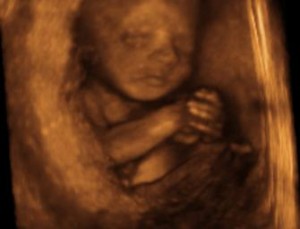In the Arms of Jesus
 I celebrated my birthday recently. My biggest wish was to celebrate with my five sons ages 13-24. A few of them are no longer living at home so I was thrilled that they were all able to be with me. Never far from my thoughts, however, were those seven precious babies I never got to hold, nurse or raise to adulthood.
I celebrated my birthday recently. My biggest wish was to celebrate with my five sons ages 13-24. A few of them are no longer living at home so I was thrilled that they were all able to be with me. Never far from my thoughts, however, were those seven precious babies I never got to hold, nurse or raise to adulthood.
It is heartbreaking to experience miscarriage, ectopic pregnancy or stillbirth.
After my miscarriages, I found that NFP was a beautiful consolation. I wanted to get pregnant again, but emotionally and physically I wasn’t ready. And with each miscarriage, I needed to give myself time to grieve.
These are some pointers I’ve come up with from my own personal experience in dealing with pregnancy loss:
1) Allow yourself to experience the stages of grieving (depending on the source, the common ones are: Denial, Anger, Bargaining, Depression, Acceptance). Grief is a unique experience for each person, but grieving is usually made up of several stages.
No matter how far along in a pregnancy, the newly-formed life is exactly that: a human life and the representation of husband and wife in love. The news that a woman is expecting and carrying a baby is usually greeted with elation. But in those first few moments when spotting occurs, and a miscarriage becomes inevitable, the experience can become an emotional (and physical) roller coaster.
2) Trust in God. This was difficult for me. I continually questioned God, “Why did you allow my baby to be conceived when you knew he wouldn’t be born?” Eventually, I experienced a light bulb moment: my baby, even though he died before birth, is a great gift from God and now waits for me in heaven.
During one particularly heartbreaking miscarriage, I cried out to my spiritual director, sharing with him that I was torn between saying, “God, Your will be done,” and “Please, God, don’t make me go through this again.” His loving response was: “Perhaps God is asking you to sacrifice the joy of holding this child in your arms so that He may quickly hold your child for all eternity in heaven.”
For me, the image of my baby in the arms of Jesus was a great consolation.
3) Talk to your spouse and comfort each other. Communication is important, especially in the aftermath of a miscarriage. Couples who use NFP must communicate about birth regulation and how soon the couple will be ready to conceive again. Conversations about fertility, abstinence and planning another pregnancy helped me as I grieved.
It is normal for both husband and wife to grieve. In my experience, because I was the one who carried the child, not to mention that I’m more emotional, miscarriage affected me differently than it did my husband.
4) Talk to your friends, especially those who have gone through miscarriage and pregnancy loss. In many ways, grief is a very unique experience. Some people grieve very publicly; others are very private.
5) Accept Help, especially with things like meals or assistance with other children. Grief counseling can also be helpful.
6) Write your thoughts in a journal. Sometimes I wouldn’t be able to sleep and wanted to talk to someone (and didn’t want to wake my husband). Writing in a journal became especially helpful for me. My journal actually became my first published article in 1995, Five Little Souls in Heaven, and later became the basis for my first novel, Emily’s Hope.
7) Take your grief to God in prayer because God grieves with you. Some days, prayer was difficult and all I could do was manage was, “Please God, help me.”
Karen Edmisten’s new book, After Miscarriage, A Catholic Woman’s Companion to Healing and Hope is a terrific resource for those who have experienced baby loss. Besides sharing her own experience, the author also includes stories of mothers who have endured baby loss (my own story, “Eternal Gifts” is included).
For more resources on pregnancy loss, check out this link on my blog: Baby Loss Links as well as my interview about miscarriage on Pat Gohn’s Among Women Podcast from 2011.

